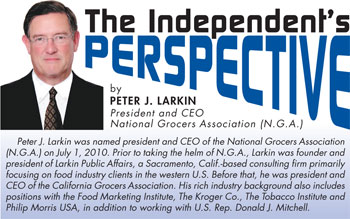Last updated on September 5th, 2012 at 04:09 pm
 Back in early August, right before members of Congress hightailed it back to their districts for the August recess period, the Administration and Congress finally came to an agreement at the 11th hour to raise the nation’s debt limit. A major part of that agreement was the creation of a new 12-member “super committee”—formally known as the Joint Select Committee on Deficit Reduction—charged with finding more than $1.5 trillion in cuts by Nov. 23, 2011. To say that everything is on the table might be an understatement. Farm subsidies to Medicare, defense contracts to tax reform—everything will be evaluated and the results could have a profound impact on your businesses.
Back in early August, right before members of Congress hightailed it back to their districts for the August recess period, the Administration and Congress finally came to an agreement at the 11th hour to raise the nation’s debt limit. A major part of that agreement was the creation of a new 12-member “super committee”—formally known as the Joint Select Committee on Deficit Reduction—charged with finding more than $1.5 trillion in cuts by Nov. 23, 2011. To say that everything is on the table might be an understatement. Farm subsidies to Medicare, defense contracts to tax reform—everything will be evaluated and the results could have a profound impact on your businesses.
The “super committee” includes co-chairs Sen. Patty Murray (D-WA) and Rep. Jeb Hensarling (R-TX), as well as committee members: Sens. John Kerry (D-MA), Max Baucus (D-MT), Jon Kyl (R-AZ), Pat Toomey (R-PA) and Rob Portman (R-OH), and Reps. Dave Camp and Fred Upton both Republicans from Michigan, James Clyburn (D-SC), Xavier Becerra (D-CA) and Chris Van Hollen (D-MD).
One of the most obvious areas the committee is likely to explore is the area of reforms to the nation’s tax systems. While Republicans have declared tax increases a non-starter, it is certain that taxes in some form are part of negotiations. Don’t forget there are a number of temporary tax provisions that will expire at the end of 2012, possibly giving the committee an opportunity to explore additional revenues.
Currently, the estate tax, or death tax, is levied on estates valued at less than $5 million per individual and married couples valued at up to $10 million. The top tax rate is set at 35 percent for the estate, gift and generation-skipping transfer taxes through 2012.
These favorable rates, supported by N.G.A. absent full repeal, allow family businesses to plan for the future and help preserve the business for future generations. The Obama Administration and Democratic leadership has advocated for a less favorable exemption of $3.5 million with a top rate of 45 percent, to which N.G.A. is opposed.
The 2001 and 2003 Bush individual tax cuts will be expiring at the end of 2012 as well. There will be enormous pressure to allow those tax cuts to expire, for at least some individuals, which will certainly have a negative impact on those businesses operating as Subchapter S Corporations and other pass-through entities.
Another important tax provision that may be considered is the accounting method Last In, First Out (LIFO). This long accepted accounting method allows businesses which maintain inventories subject to inflation to take the current commodity costs instead of the price paid when the commodity was acquired, preventing the company from paying taxes on phantom profits. LIFO is widely used in the supermarket industry and must be preserved. The Obama Administration has recommended repealing LIFO, forcing businesses to pay taxes on millions in phantom “reserves.” N.G.A. has strongly opposed this effort in the past and as a steering committee member of the LIFO Coalition will continue to urge Congress to oppose these efforts.
Tax credits and exemptions will likely be another area the new committee considers, including programs such as The Work Opportunity Tax Credit (WOTC). In 2010 alone WOTC helped employ 968,000 people, many of whom typically face barriers to employment. Many grocery retailers and wholesalers have taken advantage of this program, which provides a tax credit up to $2,400 for hiring individuals from nine targeted groups. The program’s extension through the end of 2012 was brokered in last years’ budget agreement between President Obama and Speaker Boehner. Since that time the economy has slowed, unemployment has crept up and additional stimulus is unlikely to be considered. WOTC has never been more important than right now; however, the Administration is reported to be considering eliminating or restricting the program to cut costs—such costs will hamper the recovery and will not help create confidence.
Recently, N.G.A. created a Tax Committee of experts from member companies to review and make recommendations on tax policy that are fair and balanced. To provide input to the committee, N.G.A. polled member companies in an informal survey with respondents listing in priority of importance: individual tax rates for flow-thru entities, corporate income tax rates, federal estate taxes, capital gains and individual rates, accelerated write-off of capital expenditures, WOTC, and repeal of LIFO, which 60 percent of respondents determined was significant.
The coming weeks and months will be a significant time for our industry and the country as a whole. Twelve Members of Congress will be making decisions that will likely profoundly impact your businesses and your lives. N.G.A. will be diligently working to represent your interests in Washington and we look forward to your active support and engagement!





